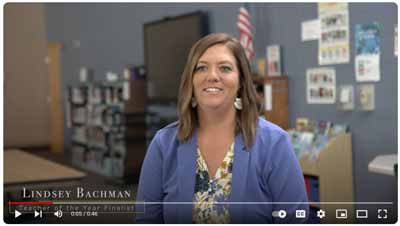Lindsey Bachman
3rd Grade, Upper Elementary School, Mobridge

What made you decide to go into teaching?
I went into teaching based on my experiences as a high school student. In my high school classes I was able to do peer tutoring. In my math classes, I was given the opportunity to lead lessons – helping explain problems on the board. And I realized I really loved doing that.
I job shadowed my superintendent (my principal when I was a student), and I was given other opportunities to experience what being an educator is, and I really liked it.
In my mind in high school, I was going to do high school education. But after I worked with younger kids in my summers, I decided to pursue elementary education.
What’s the best part of teaching?
The students, hands down. They are the reason why we all go into education. They’re the reason we show up every day. They are what drives us.
I enjoy having kids come to my classroom, and move on, and I can see them as they grow older. That’s the great thing about living in a small town. You get to see them around town, or at school events, and it’s great. You get to be a part of their lives. They don’t always need a teacher, but they need somebody there, and it’s great to be that somebody.
What’s the most challenging part of teaching?
Embracing change and adapting to it. Change has been thrown at us in so many levels. Education is evolving, and that’s exciting. It’s a good thing. We need to evolve like our kids are evolving.
Sometimes change can be hard, though, so our first reaction is to resist it. We have to accept that change is part of life. We have to shift our mindset of adaptation and accepting new ways of doing things. I think it’s important that we see change as opportunities for our students, for us as teachers, and even for our community and school district.
If you could go back in time and give yourself some advice at the start of your career, what would that advice be?
It’s okay to not know everything. I feel like when you first come out of college, sometimes you feel like you’re supposed to know everything. I would tell my younger self that it’s okay to not know everything, and it’s okay to ask for help. Asking for help is a sign that you’re a bigger person, not a lesser one.
Do you have any, “it’s weird but it works” teaching strategies?
Something that I think is really important when you’re handling students and building relationships, is meeting them where they’re at. I know I’m not the only teacher who knows this, but I think it’s so important. We can’t just ask students to be at a place that they haven’t gotten to yet.
It’s important to meet students where they are at. Especially with my students with their walls built up. You have to meet them where they’re at and work with them there.
What’s one thing about teaching that people (non-teachers) don’t seem to know about teaching?
There’s a lot. I think that people who aren’t teachers don’t know or understand the amount of time that teachers put into planning, preparing, adapting, reviewing, reflecting, everything. I think it’s important that people understand that it’s not just following a book. Teachers are always asking, “are my students ready to move on?” The time and process it takes to make sure that students are showing growth and understanding concepts-- they’re ready to move forward. It’s one of the hardest things teachers have to do, but it’s also one of the most overlooked.
You’ve been teaching for more than 12 years. What’s one thing that has stayed constant over the years?
The love for the job. I wake up every day and I come to work not dreading what I’m doing. I think it’s important for us as educators. I’ve never questioned, never thought that this isn’t something I want to be doing. I love education. I don’t see a life without education. It’s so rewarding.
